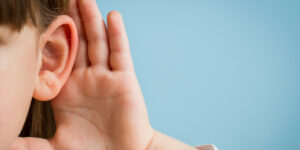Dr Boreham’s Crucible: ‘Better not louder’, Audeara is tuned in to the global audiology market

Ear to the ground: Tim Boreham is one of Australia's best-known small-cap share analysts and business journalists.
In the days of yore, we either urged grandma to buy a set of hearing aids or YELLED AT HER LIKE THIS!!
Of course, many hearing-impaired folk own hearing aids but are loath to wear them, so you still have to YELL AT THEM LIKE THIS!!
But the advent of headphones and buds mean that more augmented hearing tools are available – and the acceptance of having appendages in one’s ear means they are more likely to wear them.
The ASX-listed Audeara (ASX:AUA) has developed headphones that adjust the volume and other levels to the wearer’s individual profile, with the help of algorithmic-based technology.
These aural aids don’t replace hearing aids but enhance the ability of hard-of-hearing people to enjoy music, television or Zoom calls and the like.
Audeara co-founder Dr James Fielding says the principle of the platform is “better, not louder”. He compares the experience to a driver listening to the radio with the window open and then closing it.
“You haven’t changed the volume of your radio by one iota, but your experience is transformed because you have changed other factors.”
Over the past two years, Audeara has tweaked its business model from selling its headphones in its own right, to an ‘Intel inside’ model of providing the technology to big-ticket international customers (see below).
Home-grown innovation
A Brisbane medical graduate, Fielding became frustrated by the ponderous hearing test process while doing his training.
Unlike 99.999% of folk with good intentions, he did something about it. He devised the technology with fellow Queensland University medical students Chris Jeffery and Alex Afflick (now the company’s chief technology officer).
In reality, headphones are merely headphones in a hardware sense. Audeara’s ‘secret sauce’lies in the in-built testing function that does away with bulky audiometers that cost $15,000.
In the testing process, the user dons the headphones and, via beeps, the volume is turned down to the hearing threshold (bear in mind these settings vary not only from person to person, but from left ear to right ear).
Their hearing vision – yes, you read that right – led to them to developing a prototype in 2015 and then a commercial version.
Audeara listed on the ASX in May 2021, having raised $6 million at 20 cents apiece.
Deals, deals, deals
Audeara’s A-01 and A-02 headphones are sold via hearing clinics, notably the Milan-based giant Amplifon which has more than 300 outlets here (and 5,700 centres in 29 countries).
The company also won a tender to be the only ‘over ear’ headphone sold in Amplifon clinics, the world’s biggest audiology retailer.
Audeara also sells via Audika Australia, part of the Danish Demant Group.
Audeara accounts for half of all non-hearing aid devices sold under the Federal Government’s Hearing Services Program and one-fifth of those provided under the Australian Department of Veterans Affairs banner.
Then there’s a deal with Clinico, Taiwan’s biggest audiology and hearing aid provider, that involves Audeara providing white-labelled sound buds.
Clinico launched these devices, Clinico Sound Earbuds CS, on January 22 this year.
The tie-up also offers entrée into China.
Audeara has a presence in 1500 local audiology (and eyecare) clinics.
The company has tie-ups with Specsavers and a reseller agreement with independent chain George & Matilda Eyecare, which has 115 locations.
The company sold headphones in the US but made the call to exit that market because of an inadequate return on investment.
“It’s all or nothing cracking into the US,” Fielding says. “We weren’t seeing what we needed to keep committing resources to the market.”
He said the company spent a modest $1 million, “which was not money wasted as it resulted in us gaining Avedis Zildjian as a partner.”
A cymbal of success
Avedis who?
The world’s oldest musical instrument maker, that’s who.
In February 2024, Audeara won its first purchase order from the company, which makes cymbals, drumsticks, gongs and other percussive paraphernalia.
Audeara supplies the personalised sound algorithms for Avedis Zildjian’s Alchem-E Perfect Tune headphones.
Founded in Constantinople (now Istanbul) by Armenian Avedis Zildjian, the company is one of the world’s longest continuous-operating enterprises with a 400-year history.
(A family name conferred by the prevailing Sultan Mustafa I, Zildjian literally means ‘cymbal maker’ in Turkish.)
Avedis Zildjian now operates from Norwell, Massachusetts but remains controlled by the Zildjian family.
These days, all Zildjian instruments are made in the US at the company’s cymbal factory in Norwell and drumstick/mallet facility at Newport, Maine.
Am I hearing that price correctly?
Why are hearing aids so damned expensive?
Fielding notes the physical cost of building a hearing device – in effect a blob of plastic with electronic componentry – is around $20.
Yet, consumers end up paying $10,000, or $15,000 or more.
As with a new drug which might cost a few cents to make but could sell for thousands of dollars, the cost of a hearing aid covers the research and development, the clinicians’ time and the retailers’ and distributors’ margins.
“From a business point of view they are solving a very big problem,” he says, in reference to the knock-on effects of hearing loss such as social isolation, depression and dementia.
He adds: “The difference between a good and bad one is distinctly notable: they are chalk and cheese.”
There’s also an element of charging what they can charge because the industry is an oligopoly, with five groups accounting for 90% of the market.
But with US regulatory changes that enhance the availability of much cheaper over-the-counter (OTC) hearing aids, the times they are a changing.
“The changes mean a device priced at more like an Airpod than a hearing aid could do the job for a large number of people who aren’t ready to make the next step.”
Coming to the (aid) of needy patients
In September last year, Audeara signed a letter of intent with Taiwan’s Eastech to bring hearing aids to the Chinese market.
There are key distinctions between the Eastech and Clinico deals.
As opposed to ear buds, the Eastech tie-up pertains to medical devices – hearing aids – that are formally designated as such.
Rather than a co-branding arrangement as per Clinico, Audeara provides the background technology to Eastech and ‘clips the ticket’ on each unit sold.
The hearing aids are marketed under a separate, well known hearing aid brand.
The devices will be licensed for distribution in China under Eastech’s National Medical Products Administration (NMPA) certification.
Given they are sold via hearing clinics, the Audeara headphones have more gravitas than headphones sold at, say JB Hi-Fi.
Fielding notes Audeara is not a medical device manufacturer, but a technology provider. Audeara itself does not have to go through the rigmarole of ongoing compliance and certification.
“For a company that wants to launch a hearing aid product, we can provide the tech and the know-how,” he says.
“We are not trying to beat the $12,000, top-tier hearing aids.
“But we offer an incredible solution to enhance hearing, as well as our secret sauce on the entertainment front.”
Financials and performance
On June 18, Audeara said revenue for the 11 months to May 31, 2025, was a record $3.64 million, up 14% year on year.
The growth was driven by Clinico’s ear bud launch and co-branded partnerships, while Australian wholesale revenue grew 17% to $1.67 million.
In April, Audeara reported March (third) quarter revenue of $1.26 million, 230% higher than the December 2024 quarter and 113% better year-on-year.
Cash outflows were $73,000, an improvement on December quarter’s $578,000.
The company had $1.9 million in cash at March 31, 2025.
During the quarter, Clinico lodged an initial order of $570,000.
The company also received a second $1.5 million purchase order from Avedis Zildjian, following an initial $2.1 million order in early 2024.
About 50% of Audeara’s revenue derives from Australia, but overseas revenue is likely to account for two-thirds by the end of 2025.
Over the last 12 months, Audeara shares have whispered between six cents (late September last year) and the current trough of 2.1 cents.
The shares peaked at 16 cents just after listing.
The company’s biggest shareholder is Clinico’s David Lin, who took a 20% Audeara stake as part of the deal.
Local reimbursement remains strong despite NDIS dip
While the headphones are not devices, Audeara enjoys the best of both worlds in that they are still reimbursable by government insurers.
Locally, the tab is picked up by the Federal Hearing Services Program (HSP) and the Department of Veterans Affairs (DVA) rehabilitation program.
Then there’s the National Disability Insurance Scheme – NDIS – an entrée to one million eligible users. Last year, the NDIS accounted for 10% of local revenue.
The NDIS funding falls into the categories of ‘daily adaptive devices’ and ‘hearing specific’. With the latter, a whopping 25% to 30% of people on the NDIS are eligible.
But NDIS revenues have “softened” from September as a result of the agency’s restructure, as changes meant recipients had less discretion after receiving funding.
“Our biggest markets always have been the DVA and the HSP,” Fielding says.
“The NDIS was a great contributor to the bottom line, but we haven’t put a tremendous focus on it.”
The NDIS revenue contribution is now more likely to be in the low single digits.
Dr Boreham’s diagnosis
“I know of judges who don’t wear hearing aids,” Fielding says. “When is it more important to be hearing what someone is saying?”
Indeed – justice should be blindfolded (impartial), but not deaf.
It’s disturbing to hear – or not hear – the extent of undiagnosed hearing loss.
Depending on who you ask, about 10% of the world’s 10-year-olds and up to 50% of 75-year-olds are hearing impaired.
The World Health Organisation estimates that one billion people aged under 30 will have a life-affecting hearing loss by 2030.
Cochlear aside, Audeara is the only ASX-listed audiology pure play. Another exponent, Nuheara, called in the voluntary administrators in August last year.
This was despite Nuheara’s “successful” launch of its over-the-counter hearing aids in the US – and because of a breakdown in negotiations with a convertible noteholder.
However, Nuheara’s Iqbuds are still available via retailers.
Audeara shares have disappointed since listing, although the company’s wholesale approach should avoid Nuheara’s pitfall of relying on large ‘big box’ retailers.
Fielding has been topping up his shareholding “and I wouldn’t do that if I didn’t think there was extraordinary upside at the other end”.
While the high-margin legacy headphone business accounts for most of Audeara’s earnings, Fielding tips the third-party revenue eventually will dwarf the existing business.
“If we get three or four Zildjian-esque accounts it provides a sure-fire path to cash-flow break even and profitability and then we are properly rocking and rolling”.
At a glance
ASX code: AUA
Share price: 2.3 cents
Shares on issue: 179,934,383
Market cap: $4.1 million
Chief executive officer: Dr James Fielding (co-founder)
Board: David Trimboli (chair), Fielding, Hsin-Chieh (Bill) Peng
Financials*: (March quarter 2025): receipts $1.64 million (up 46%), revenue $1.26 million (up 230%), cash outflows $77,000 (previous deficit of $578,000, cash of $1.9 million (up 11%) – all comparisons are with the three months to December 31, 2024
Identifiable major holders: Fortune Pioneer (David Lin) 19.5%, David Trimboli 13.8%, James Fielding 6.5% Bill Peng 6.25%, Founders 5.08%.
Disclosure: Dr Boreham is not a qualified medical practitioner and does not possess a doctorate of any sort. What??!! There’s no need to shout!!
At Stockhead we tell it like it is. While Audeara is a Stockhead client at the time of publishing, it did not sponsor this article.
Related Topics

UNLOCK INSIGHTS
Discover the untold stories of emerging ASX stocks.
Daily news and expert analysis, it's free to subscribe.
By proceeding, you confirm you understand that we handle personal information in accordance with our Privacy Policy.








